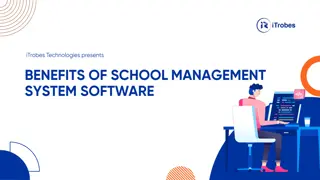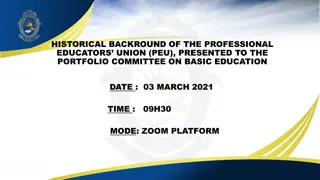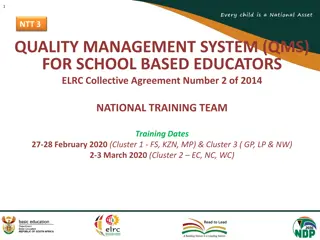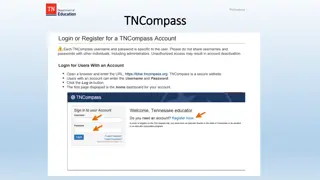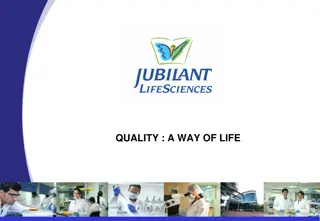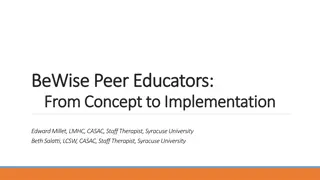Quality Management System Training for School-Based Educators
This training session, conducted by the National Training Team, focuses on Quality Management Systems (QMS) for school-based educators as per the ELRC Collective Agreement. It covers aspects such as educator appraisal instruments, work plans for school management teams, and practical sessions to enhance performance levels and school outcomes. The training includes self-evaluations, discussions, and record-keeping to ensure continuous improvement. Attendees engage in hands-on activities to apply QMS principles effectively in school settings.
Download Presentation

Please find below an Image/Link to download the presentation.
The content on the website is provided AS IS for your information and personal use only. It may not be sold, licensed, or shared on other websites without obtaining consent from the author. Download presentation by click this link. If you encounter any issues during the download, it is possible that the publisher has removed the file from their server.
E N D
Presentation Transcript
1 NTT 5 QUALITY MANAGEMENT SYSTEM (QMS) FOR SCHOOL BASED EDUCATORS ELRC Collective Agreement Number 2 of 2014 NATIONAL TRAINING TEAM Training Dates 27-28 February 2020 (Cluster 1 - FS, KZN, MP) & Cluster 3 ( GP, LP & NW) 2-3 March 2020 (Cluster 2 EC, NC, WC)
2 5. Quality Management System Practical Session
3 5.1 EDUCATOR APPRAISAL INTRUMENTS
4 5.1.1 DEMONSTRATION Appraisal Instruments
5 5.1.2 EDUCATOR APPRAISAL INSTRUMENTS Participants work PAIRS. Allocate a Post Level to each pair: Post Level 1 Post Level 2 Poste Level 3 Post Level 4 Using the Excel instrument, each participant undertakes a self- evaluation for the identified post level. Complete comments on instrument. Pair to decide on a appraiser/supervisor Supervisor to discuss self-evaluation and agree on final scores with the educator. Record comments as required. Complete one Composite Score Sheet. Feedback in plenary session.
6 5.1.3 EDUCATOR APPRAISAL INSTRUMENTS Summary Scores for School Group Activity Using the assessment instruments completed in 5.1.2, verify and record the scores and development needs of at least one educator in Annexure E 1. Discussion
7 5.2 WORK PLANS: SCHOOL MANAGEMENT TEAMS
8 5.2.1 WORK PLANS A work plan outlines what activities will be undertaken by an employee within a particular year, as well as setting specific targets and outlining outputs that need to be achieved. (ELRC Collective Agreement Number 2 of 2014 (page 21). The value of a work plan is embedded in the definition of QMS. The QMS is a performance management system for school-based educators, designed to evaluate the performance levels of individuals in order to achieve high levels of school performance. (ELRC Collective Agreement Number 2 of 2014 (page 7). The collective outputs of the SMT as illustrated in their respective work plans gives expression to (i.e. concretises) and contributes to the desired high levels of school performance. The WORK PLAN is informed by Job Descriptions in the PAM as well as the priorities of the school, provincial and national departments (e.g. Reading & Mathematics, etc.)
5.2.2 WORK PLANS FOR SMT MEMBERS 9 THE WORK PLAN HAS THE FOLLOWING COMPONENTS: Performance standards These are applicable performance standards as reflected in the QMS instrument. Key activities/ outputs Activities to be agreed to in terms of applicable job descriptions. Targets Targets (Goals) to be set for improvement within an appraisal cycle. Time-frame Period within which the targets and outputs are to be achieved. Performance indicators Measures of success to be observed for achieving specific targets and outputs. Contextual factors Unique/specific circumstances to be taken into account that have the potential to impact on the employee s ability to achieve outputs and targets. ELRC Collective Agreement Number 2 of 2014 (pages 11-12)
10 5.2.3 GUIDELINES ON DEVELOPING A WORK PLAN STEP ACTION 1 State the PERFORMANCE STANDARD 2 Select the CRITERION 3 Identify a DESCRIPTOR 4 Develop the TARGET that is quantifiable and time-bound 5 Indicate TIMELINES 6 Develop a PERFORMANCE INDICATOR 7 State any CONTEXTUAL FACTOR/S relevant to this particular activity when developing the work plan in January
5.2.3 GUIDELINES ON DEVELOPING A WORK PLAN (cont.) 11 ACTION EXAMPLE for a DEPARTMENTAL HEAD 1 State the PERFORMANCE STANDARD Management of the curriculum 2 Select the CRITERION Providing leadership, mentoring, support and development 3 Identify a DESCRIPTOR g) Organises workshops and training session for educators 4 Develop the TARGET that is quantifiable and time-bound Two workshops per quarter undertaken for Mathematics educators in the FET phase 5 Indicate TIMELINES Term 1 to Term 3 6 Develop a PERFORMANCE INDICATOR Number of workshops conducted in Mathematics in the FET Phase 7 State any CONTEXTUAL FACTOR/S relevant to this particular activity. If any
5.2.3 GUIDELINES ON DEVELOPING A WORK PLAN (cont.) 13 ACTION EXAMPLE for a DEPUTY PRINCIPAL 1 State the PERFORMANCE STANDARD Managing quality and securing accountability 2 Select the CRITERION Criterion 2: Managing the quality of teaching and learning 3 Identify a DESCRIPTOR b) Monitors marking and moderation of learner assessments 4 Develop the TARGET that is quantifiable and time-bound The moderation of learner assessments in Grades 10 and 11 will be monitored in 100% of the subjects during the first two terms 5 Indicate TIMELINES Terms 1 and 2 6 Develop a PERFORMANCE INDICATOR Percentage of subjects where moderation of learner assessments were monitored. 7 State any CONTEXTUAL FACTOR/S relevant to this particular activity. If any
14 EXAMPLE: DEPUTY PRINCIPAL
5.2.3 GUIDELINES ON DEVELOPING A WORK PLAN (cont.) 15 ACTION EXAMPLE for a PRINCIPAL 1 State the PERFORMANCE STANDARD 2. Shaping the direction and development of the school 2 Select the CRITERION Criterion 2: School Governing Body and the broader school community 3 Identify a DESCRIPTOR Ensures that the school has a functioning SGB 4 Develop the TARGET that is quantifiable and time-bound Organise a capacity building workshop for the SGB sub committees on Finance in Term 1 and Maintenance in Term 2 5 Indicate TIMELINES Terms 1 and 2 6 Develop a PERFORMANCE INDICATOR Number of workshops organised to enhance the capacity of the SGB sub-committees 7 State any CONTEXTUAL FACTOR/S relevant to this particular activity. If any
16 EXAMPLE: PRINCIPAL
17 GUIDELINES ON DEVELOPING A WORK PLAN The Departmental Head develops the work plan on only one Performance Standard, namely - MANAGEMENT OF THE CURRICULUM. The Departmental Head should have at least one (1) descriptor for each of the four (4) Criteria recorded in the work plan. The Deputy Principal and Principal develops the work plan on all seven Performance Standards. The Deputy Principal and Principal should have a minimum of one (1) descriptor for each of the seven Performance Standards, excluding Criterion 1 of Performance Standard 1.
18 5.2.3 WORK PLANS SMT GROUP ACTIVITY Participants work in groups of 3-4. Allocate a Post Level to each group Post Level 2 Poste Level 3 Post Level 4 Using the appropriate evaluation instrument, each group will complete a work plan for the identified post level. identify at least one Performance Standard, one Criterion and one Descriptor develop TARGETS, TIMEFRAMES and PERFORMANCE INDICATORS for each identified activity. Each group presents in plenary session.
19 END OF SESSION












